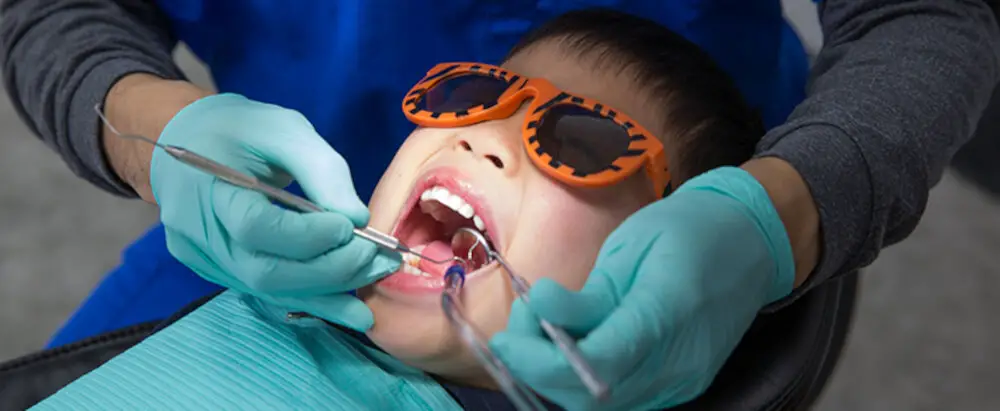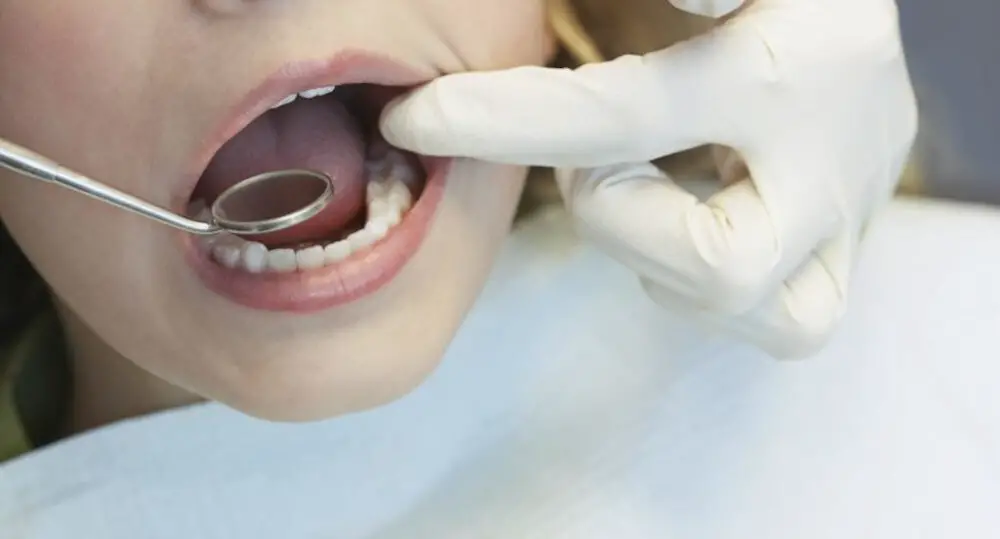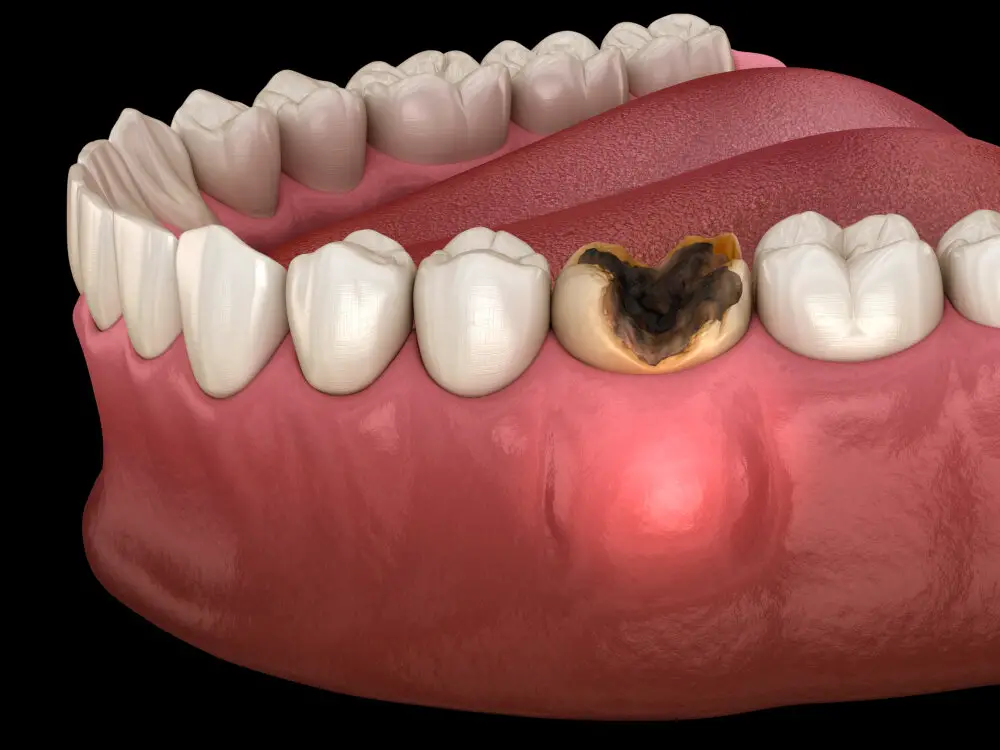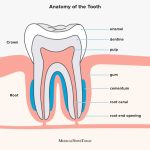Stop Tooth Pain from Sweets: Effective Home Remedies and Prevention Tips

Tooth pain is a common problem experienced by many people, particularly when consuming sweets. The sharp, shooting pain that radiates through your teeth and gums can be unbearable, making it hard to enjoy your favorite treats. Fortunately, there are several home remedies and prevention tips you can try to alleviate and prevent tooth pain from sweets. These remedies are simple, inexpensive, and effective, ensuring you can continue indulging in your favorite sweets without worrying about the pain. The causes of tooth pain from sweets are varied, ranging from tooth decay to gum disease. Sweets, particularly those high in sugar, can cause bacteria in your mouth to produce acid that erodes your tooth enamel, leading to cavities and tooth decay. If left untreated, tooth decay can progress to the inner layers of your tooth, leading to inflammation and pain. Additionally, sweet foods and drinks can cause your gums to become inflamed and sensitive, leading to gum disease, which can also cause tooth pain. With the right remedies and prevention strategies, you can effectively manage and prevent tooth pain from sweets, ensuring you can enjoy your favorite treats without any discomfort.
Tooth pain from sweets is a common dental problem that occurs due to the sensitivity of teeth. The sugar present in sweets can cause tooth decay by producing acid that erodes the enamel, exposing the nerves and causing pain. Additionally, consuming sweets can also lead to the accumulation of bacteria and plaque in the teeth, which can further aggravate the pain. Poor dental hygiene, such as irregular brushing and flossing, can also contribute to tooth pain from sweets. To prevent this, it is important to maintain good oral hygiene practices and limit the consumption of sugary foods. Furthermore, home remedies such as using fluoride toothpaste, applying a cold compress, and using desensitizing toothpaste can help alleviate tooth pain from sweets.
Managing tooth pain is crucial to prevent further damage to your teeth and gums. Tooth pain can be caused by a variety of factors, including cavities, gum disease, or even sensitivity to certain foods. Ignoring tooth pain can lead to more severe dental problems, such as tooth decay, abscesses, or even tooth loss. In addition to seeking professional dental care, there are a variety of effective home remedies and prevention tips to help alleviate tooth pain caused by consuming sweets. Proper oral hygiene, such as brushing twice a day and flossing regularly, can help prevent tooth pain and maintain overall dental health.
Home remedies for tooth pain relief

Tooth pain can be an excruciating experience that can disrupt your daily routine. While a visit to the dentist is the best solution for tooth pain, there are several home remedies that can provide temporary relief. One of the most effective home remedies for tooth pain relief is clove oil. Clove oil contains a compound called eugenol, which has anesthetic and antibacterial properties. Applying a small amount of clove oil on the affected tooth can provide immediate relief from tooth pain. Another effective home remedy for tooth pain relief is saltwater rinse. Saltwater rinse is a natural antiseptic that can help to reduce inflammation and kill bacteria in the mouth. To prepare a saltwater rinse, mix half a teaspoon of salt in a glass of warm water and swish the solution around your mouth for 30 seconds. Spit out the solution and repeat the process several times a day until the pain subsides. These home remedies are a great way to manage tooth pain until you can visit a dentist for a permanent solution.
Saltwater rinse is a simple and effective home remedy to alleviate tooth pain caused by sweets. The saline solution helps to reduce inflammation and kill bacteria in the affected area. To prepare the rinse, mix a teaspoon of salt with a cup of warm water and swish it around in your mouth for about 30 seconds before spitting it out. The saltwater rinse not only provides temporary relief from tooth pain but also promotes healing and prevents further infection. It is a natural and inexpensive solution for those who want to avoid using painkillers or other medications. Incorporating saltwater rinse into your oral hygiene routine can also help to maintain good dental health and prevent tooth decay.
Clove oil is a powerful natural remedy that can be used to alleviate tooth pain caused by sweets. This oil is derived from the clove plant and contains a compound called eugenol, which has strong analgesic and anti-inflammatory properties. When applied directly to the affected tooth or gums, clove oil can quickly soothe pain and reduce swelling. Additionally, clove oil has antimicrobial properties that can help to combat the bacteria that cause tooth decay and gum disease. To use clove oil for tooth pain, simply dilute a few drops in a carrier oil like coconut or olive oil, and apply it to the affected area with a cotton swab.
Garlic paste is a natural remedy that has been used for centuries to relieve tooth pain. Garlic contains a compound called allicin, which has antibacterial and anti-inflammatory properties that help to reduce the swelling and pain associated with toothaches. To make garlic paste, crush a few cloves of garlic and mix them with a small amount of salt. Apply the paste directly to the affected tooth or gum and leave it on for a few minutes before rinsing with warm water. Garlic paste can also be used as a preventative measure by adding it to your regular oral hygiene routine. Its antimicrobial properties can help to kill harmful bacteria in the mouth and prevent tooth decay and gum disease.
Tea tree oil is a popular essential oil that is extracted from the leaves of the tea tree plant. It has been used for centuries for its medicinal properties, particularly in treating skin conditions such as acne, eczema, and psoriasis. Tea tree oil is also known for its antibacterial and antifungal properties, which make it an effective remedy for tooth pain caused by sweets. To use tea tree oil for tooth pain, mix a few drops of the oil with a carrier oil such as coconut oil or olive oil, and apply it to the affected tooth using a cotton swab. This can help to reduce inflammation, fight infection, and alleviate pain. However, it is important to use tea tree oil cautiously, as it can be toxic if ingested in large amounts.
Hydrogen peroxide rinse is a popular and effective home remedy for tooth pain caused by sweets. Hydrogen peroxide is a natural antiseptic and disinfectant that can kill harmful bacteria and reduce inflammation in the mouth. To prepare the rinse, mix equal parts of 3% hydrogen peroxide and water and swish it around your mouth for 30 seconds before spitting it out. Be careful not to swallow the solution, as it can cause stomach upset. Hydrogen peroxide rinse can be used up to twice a week to relieve tooth sensitivity and pain. However, it is important to consult with a dentist if tooth pain persists or worsens.
Prevention tips to avoid tooth pain from sweets

Tooth pain from sweets is a common problem faced by many people. However, it is possible to prevent tooth pain by following some simple steps. Firstly, it is important to limit the consumption of sugary foods and drinks. This will help to prevent the buildup of bacteria in the mouth, which can lead to tooth decay and pain. Drinking plenty of water can also help to rinse away any sugar and acids that are left in the mouth after eating sweets. Another important prevention tip is to maintain good oral hygiene. This includes brushing your teeth twice a day with fluoride toothpaste, flossing once a day, and using mouthwash to kill bacteria. It is also important to visit your dentist regularly for check-ups and professional cleanings. This will help to keep your teeth and gums healthy, and prevent any problems from developing. By following these prevention tips, you can enjoy sweet treats without the pain and discomfort that often come with them.
Brushing and flossing regularly is an essential part of maintaining good oral hygiene, and it is also an effective way to prevent tooth pain caused by sweets. Brushing your teeth at least twice a day, especially after consuming sugary foods, helps to remove the plaque and bacteria that build up on your teeth, which can lead to cavities and tooth decay. Flossing is equally important as it helps to remove food particles and bacteria from between your teeth and gums, where your toothbrush can’t reach. By incorporating these simple and easy habits into your daily routine, you can protect your teeth from the harmful effects of sweets and keep your smile healthy and pain-free.
Limiting sugar intake is crucial for preventing tooth pain caused by sweets. Sugar is the primary culprit behind tooth decay and cavities, as it feeds the harmful bacteria in our mouths that produce acid, which erodes the tooth enamel. Therefore, reducing the amount of sugar you consume can significantly lower the risk of developing tooth pain and other dental problems. To achieve this, it is essential to avoid sugary foods and drinks, such as candy, soda, and processed snacks. Instead, opt for healthier alternatives like fresh fruits, vegetables, and water. Additionally, don’t forget to brush and floss regularly to keep your teeth clean and healthy. By taking these simple steps, you can protect your teeth from the harmful effects of sugar and enjoy sweet treats without the pain.
Fluoride toothpaste and mouthwash are essential in preventing tooth decay, which can cause tooth pain from consuming sweets. Fluoride, a naturally occurring mineral, helps to strengthen tooth enamel and make it more resistant to acid attacks. Toothpaste containing fluoride should be used twice daily for at least two minutes, and mouthwash should be used after brushing to give an extra layer of protection. It’s important to note that young children should use a pea-sized amount of toothpaste with supervision to ensure they do not swallow it. By using fluoride toothpaste and mouthwash regularly, you can help prevent tooth pain and keep your teeth healthy and strong.
Chewing sugar-free gum can be a great way to satisfy your sweet tooth without causing tooth pain or damage. Not only does it freshen your breath and promote saliva production, but it also helps to remove food particles and plaque from your teeth. The act of chewing also stimulates blood flow to the gums, which can help to reduce inflammation and discomfort. However, it’s important to note that while sugar-free gum is a better alternative to sugary snacks, it should not be relied on as a substitute for proper dental hygiene practices such as brushing and flossing.
One of the most effective prevention tips to stop tooth pain from sweets is to drink water after consuming them. Drinking water helps to wash away any residual sugar or acid that may be left in the mouth, reducing the risk of tooth decay and cavities. It also helps to neutralize the pH level in the mouth, reducing the acidity that can lead to enamel erosion and tooth sensitivity. Additionally, drinking water can help to stimulate saliva production, which is essential for maintaining oral health and preventing tooth decay. By making it a habit to drink water after consuming sweets, you can protect your teeth and enjoy your favorite treats without worrying about tooth pain.
Foods and drinks to avoid for tooth pain relief

Tooth pain can be excruciating, and it can be tempting to reach for your favorite sweets and drinks to ease the discomfort. However, there are certain foods and beverages that you should avoid if you want to alleviate your toothache. Sugary foods and drinks such as candy, soda, and fruit juice can worsen tooth pain as they contain high levels of sugar that can be harmful to your teeth. Sugar feeds the bacteria in your mouth, which can cause cavities, leading to tooth decay and pain. Consuming foods and drinks that are high in sugar can also cause inflammation in the gums, causing further discomfort and pain. Another food to avoid if you have a toothache is acidic foods such as citrus fruits, tomatoes, and vinegar. These foods can cause tooth enamel erosion, making your teeth more vulnerable to decay and sensitivity. Also, acidic drinks such as lemonade, orange juice, and sports drinks can create an acidic environment in your mouth, leading to enamel erosion and tooth sensitivity. If you are experiencing tooth pain, it is best to avoid these foods and drinks and opt for healthier options such as water, milk, and plain yogurt. These foods are not only beneficial for your overall health but also promote good oral health, prevent tooth decay, and alleviate toothache.
Sugary and acidic foods and drinks are notorious for causing tooth pain and decay. Consuming sugary items such as candy, pastries, and soft drinks can lead to the formation of harmful bacteria that erode tooth enamel, resulting in cavities and sensitivity. Acidic foods and beverages such as citrus fruits, tomatoes, and carbonated drinks can also contribute to tooth pain by causing erosion and weakening of the enamel. Therefore, it’s essential to limit the intake of sugary and acidic foods and drinks, and if consumed, it’s crucial to rinse your mouth with water afterward to neutralize the acid and prevent tooth decay. By taking these preventive measures, you can significantly reduce the risk of tooth pain and maintain good oral health.
Hard and sticky candies are some of the most popular sweets among people of all ages. They come in various shapes, sizes, and flavors, and are often enjoyed as a quick and easy treat. However, these types of candies can be a nightmare for your teeth. Hard candies can cause tooth fractures or chips, while sticky candies can stick to the teeth for prolonged periods, increasing the risk of tooth decay. It is recommended to limit the consumption of hard and sticky candies and to rinse your mouth with water or brush your teeth after eating them to remove any residual sugar. This will help to prevent tooth pain and other dental problems associated with these types of sweets.
Carbonated drinks, also known as fizzy drinks or soda, are popular beverages consumed worldwide. These drinks are typically made by adding carbon dioxide gas to water, along with sweeteners, flavorings, and preservatives. While they may be enjoyable to drink, especially on a hot day, carbonated drinks can have negative impacts on dental health. The carbonation in these drinks can erode tooth enamel, leading to tooth sensitivity and pain. Additionally, the high sugar content in many carbonated drinks can contribute to tooth decay and cavities. It is important to limit consumption of these beverages and practice good oral hygiene to prevent tooth pain and other dental problems.
Citrus fruits are not only delicious and refreshing but also rich in Vitamin C, which is essential for maintaining good oral health. Oranges, lemons, limes, and grapefruits are some of the most popular citrus fruits that can help alleviate tooth pain caused by sweets. The high acidity in these fruits helps neutralize harmful bacteria in the mouth, preventing tooth decay and gum disease. Additionally, the Vitamin C in citrus fruits helps boost the immune system, which can aid in the healing process of any existing oral infections or inflammations. Incorporating citrus fruits into your diet can not only help prevent tooth pain but also promote overall oral health.
When to see a dentist for tooth pain from sweets

Tooth pain caused by sweets is a common issue that many people face. It is important to know when to see a dentist for this type of pain. If the pain is severe or persistent, it is crucial to make an appointment with a dentist as soon as possible. This type of pain can be caused by cavities or other dental issues that require professional treatment. In some cases, tooth pain from sweets can be a sign of a more serious dental problem, such as an infection or abscess. Delaying treatment can lead to further damage and even tooth loss. Therefore, it is important to seek dental care promptly to prevent any complications. In addition to severe or persistent pain, other signs that indicate a visit to the dentist is necessary include swelling or bleeding of the gums, sensitivity to hot or cold foods, or a foul taste in the mouth. If you experience any of these symptoms or notice any changes in your dental health, it is best to consult a dentist. A dental professional can diagnose the issue and provide the necessary treatment to alleviate pain and prevent further damage. Regular dental check-ups can also help identify and address any dental problems before they become more serious. Overall, it is important to take tooth pain seriously and seek professional dental care when necessary to maintain optimal oral health.
Persistent pain or sensitivity is a common dental problem that affects a large number of people worldwide. It can be caused by a variety of factors, including tooth decay, gum disease, dental trauma or injury, and even poor oral hygiene. This type of pain or sensitivity can be particularly frustrating when it is triggered by sweet foods, as it makes it difficult to enjoy some of the most popular treats. Fortunately, there are a number of effective home remedies and prevention tips that can help to alleviate tooth pain from sweets and reduce the risk of future dental problems. By following a few simple steps, individuals can enjoy their favorite sweet treats without having to suffer from persistent pain or sensitivity.
Bleeding gums can be a sign of gum disease, which is caused by the buildup of plaque on the teeth. This can lead to inflammation and infection, causing the gums to bleed easily. Poor oral hygiene, using tobacco products, hormonal changes, and certain medications can also contribute to bleeding gums. To prevent bleeding gums, it’s important to practice good oral hygiene by brushing twice a day, flossing daily, and using an antiseptic mouthwash. Eating a healthy diet rich in vitamins and minerals can also help keep gums healthy. If bleeding gums persist, it’s important to see a dentist to rule out any underlying dental problems.
Loose or broken teeth can cause excruciating pain when consuming sweets. The sensitivity can be caused by a variety of reasons, such as tooth decay, gum disease, or trauma to the teeth. If left untreated, the problem can worsen, leading to more severe pain and discomfort. It is crucial to seek professional dental care as soon as possible to prevent further damage and ensure proper treatment. In the meantime, avoiding sticky or hard sweets and maintaining good oral hygiene can help alleviate the pain and prevent further damage to the teeth.
Bad breath or an unpleasant taste in the mouth can be caused by a number of factors such as poor oral hygiene, certain foods and drinks, smoking, medications, and medical conditions. It can be embarrassing and affect your self-confidence. To prevent bad breath and improve the taste in your mouth, make sure to brush and floss regularly, use mouthwash, drink plenty of water, avoid tobacco and alcohol, and eat a balanced diet with plenty of fruits and vegetables. Additionally, certain herbs and spices such as cinnamon, cloves, and fennel can help freshen breath and improve taste. If bad breath persists, it may be a sign of an underlying medical condition and you should consult a dentist or doctor.
Tooth pain caused by sweets is a common discomfort that most people experience. Fortunately, there are simple home remedies and prevention tips that can help alleviate the pain and avoid future occurrences. One of the most effective remedies is to rinse the mouth with warm salt water, which helps reduce inflammation and kill bacteria. Applying a cold compress to the affected area can also help numb the pain. In terms of prevention, it’s important to maintain good oral hygiene by brushing and flossing regularly, as well as avoiding sugary foods and drinks. Chewing sugar-free gum can also help stimulate saliva production, which helps neutralize acid and prevent tooth decay. By following these simple tips, you can stop tooth pain from sweets and maintain a healthy, pain-free smile.
When it comes to tooth pain, it’s essential to seek professional help if necessary. While home remedies and prevention tips can provide temporary relief, they may not address the root cause of the pain. A dentist can examine your teeth and gums, identify the underlying issue, and provide a tailored treatment plan to alleviate the pain and prevent further damage. Delaying professional help may result in the worsening of the condition, leading to more pain, discomfort, and costly treatments in the future. Therefore, it’s crucial to prioritize your oral health and seek expert advice whenever necessary.
Maintaining good dental health is essential to prevent tooth pain and other oral health problems. Brushing your teeth twice a day and flossing at least once a day can help remove plaque and prevent the buildup of harmful bacteria. It is also important to schedule regular dental checkups and cleanings to catch any potential problems early on. Additionally, avoiding sugary foods and drinks can help prevent tooth decay, which is a leading cause of tooth pain. By taking care of your dental health, you can enjoy a healthy smile and avoid the discomfort of tooth pain in the future.
Conclusion

In conclusion, tooth pain from sweets can be a real discomfort, but luckily there are several effective home remedies and prevention tips that can alleviate the pain and ensure healthy teeth. From practicing good oral hygiene to incorporating tooth-friendly foods into your diet, there are plenty of ways to prevent tooth pain from sweets. And if you do experience discomfort, natural remedies such as clove oil, saltwater rinse, or chewing on garlic can provide relief. By taking care of your teeth and being mindful of your sugar intake, you can enjoy your favorite sweets without the unpleasant side effects. Remember, prevention is key when it comes to tooth pain, so make sure to prioritize your dental health and seek professional help if necessary.






